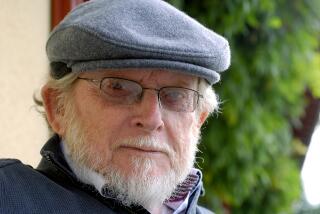Niven Busch; Screenwriter, Author of ‘Duel in the Sun’
- Share via
Niven Busch, the novelist and scenarist who continued his prodigious output well into his old age, died Sunday in San Francisco.
Author of “Duel in the Sun,” “California Street” and more, Busch was an adapter of the work of others and creator of fiction that has been translated into many languages.
He was born in New York 88 years ago and educated at Princeton University. Busch worked for Time magazine and The New Yorker as a writer and editor before moving to Hollywood in 1931.
One of his first screenplays, “In Old Chicago,” a marginally factual account of events leading up to the great Chicago fire, brought him an Academy Award nomination in 1937.
His other screenplays included “The Postman Always Rings Twice,” “The Westerner,” “Pursued,” “Man from the Alamo,” “The Moonlighter” and “Babbitt.”
He spent 15 years as a screenwriter and told The Times in 1971 that the discipline “taught me everything I know about story construction.”
He also said that working on films produced “writer’s block” when it came to more serious work.
“I always wanted to write a novel,” he said. “I started two or three . . . and then dropped them when a film job came along.
“I finally figured out the problem: When I was writing a novel, no one was paying.”
By 1952, he was able to buy a ranch in Hollister, near Salinas, where he moved to write the fiction that had eluded him.
He told the anthology Contemporary Authors that there he wrote daily from 9:30 a.m. to 1:30 p.m. and “took glory in every minute.”
His novels came to include “The Carrington Incident,” “The Furies,” “The Hate Merchants,” “The Actor,” “The San Franciscans,” “The Gentleman from California” (a fictional account of Richard M. Nixon’s career) and “Continent’s Edge” in 1980, a tale of a family oil dynasty.
He also taught at University of California campuses at Irvine, San Diego and Berkeley.
While at Irvine, he told The Times that his was a life without regret, that he never looked back at the financial glories that were his in Hollywood.
“Screenplays are all right as long as you stay pretty detached but they’re a crap game artistically--you’re dealing with 132 departments at the studio and any one of them can goof.
“If you’re a novelist, you’re everything from wardrobe chief to cameraman and you don’t have to worry about other people messing up your story.”
Busch was married several times. His wives included actress Teresa Wright, whom he married in 1942 and divorced 10 years later.
Survivors include his wife, Suzanne, and seven children.
“I do not lack for begats,” he liked to say.
More to Read
The biggest entertainment stories
Get our big stories about Hollywood, film, television, music, arts, culture and more right in your inbox as soon as they publish.
You may occasionally receive promotional content from the Los Angeles Times.









